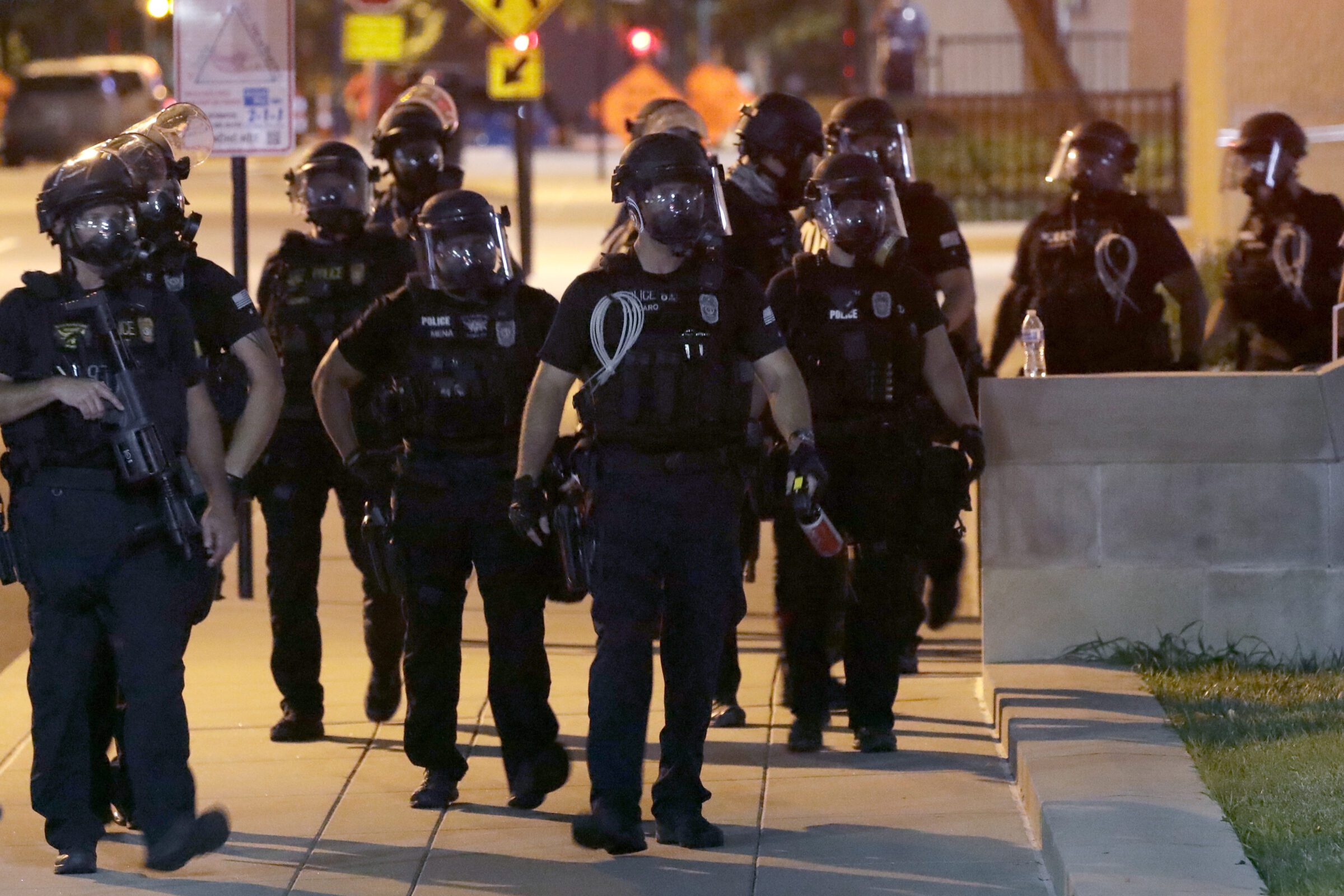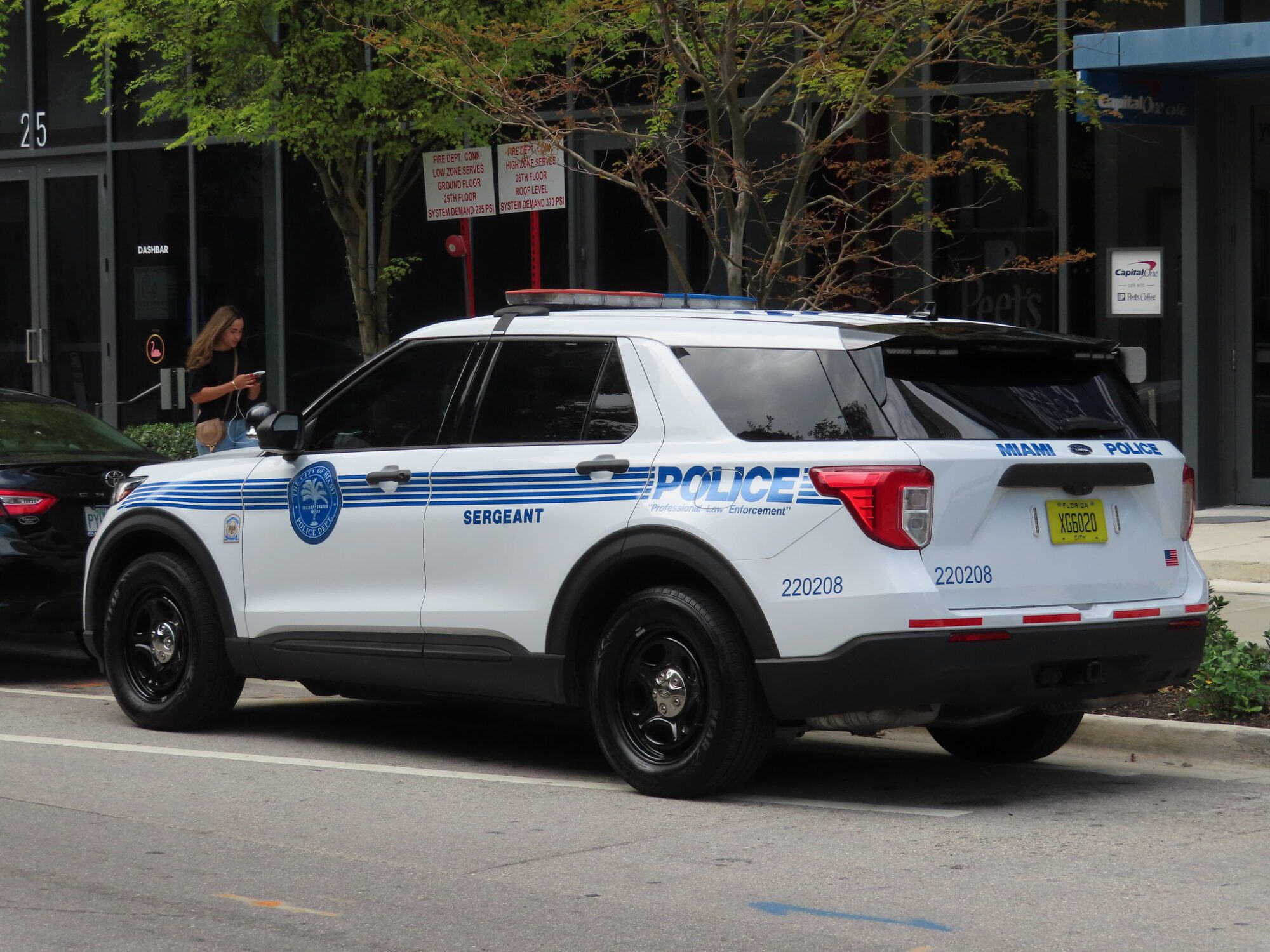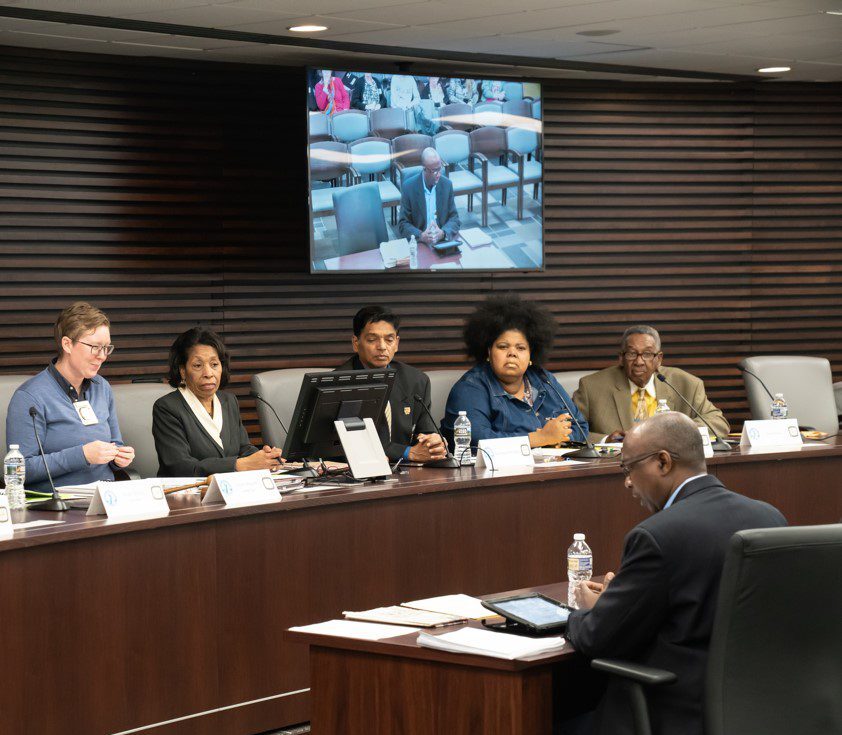“A Vote Against Democracy”: Missouri Forces One City to Lock In More Money for Police
Voters approved a statewide measure requiring Kansas City to spend at least 25 percent of its general revenue on police. It’s the only city in the state with no control over how it’s policed.
| August 7, 2024

As head of a civic organization based in Kansas City, Gwendolyn Grant would like to weigh in on how the city spends its money. But Missouri Republicans have twice in recent years organized statewide referendums to force the city to spend a large chunk of its budget on policing, throwing local policy into the hands of voters across the whole state. For the Kansas City groups that opposed the measures, campaigning felt like an impossible task from the start, given the enormous amount it would cost to run ads and reach people who live hundreds of miles away.
“Statewide, millions of dollars are required to run an effective campaign,” said Grant, the president and CEO of the Urban League of Greater Kansas City. “Without the resources to educate the voters on that very issue, it’s just hard.”
On Tuesday, Missourians adopted the most recent ballot measure over Kansas City’s finances, though they did so by a surprisingly narrow margin, 51 percent to 49 percent.
Known as Amendment 4, the statewide ballot measure applies only to Kansas City and raises the minimum required amount that the city must allocate to its police department from 20 percent to 25 percent of its general revenue. That increase will lock in tens of millions of dollars in local spending each year, in addition to the hundreds of millions the city was already required to spend on policing.
Adding insult to injury for Kansas City, local officials will have no say in how their money gets spent by the police department—even as they are required by the state to pour more funds into it.
That’s because Kansas City is the only city in Missouri that doesn’t control its police department. The Kansas City Police Department is instead run by a five-member board, four of whom are appointed by the governor; the mayor has the fifth seat. This arrangement is unique in the country for a city of this size, according to The Beacon News.
“We’re investing in an institution that has no accountability,” Grant told Bolts.
“No matter what challenges or needs we have in Kansas City that might require those funds, we’re required to give those funds for the police department,” she added. “That takes money away from infrastructure investments, that takes money away from just basic services.”
The full results within Kansas City, which is split between four counties, were not immediately known. But most of Kansas City falls within Jackson County; in that section of the city, Amendment 4 failed by an overwhelming margin, 66 to 34 percent. (Cass, Clay, and Platte counties, which contain more suburban areas of Kansas City, did not release precinct-level results as of publication.) The measure also lost by 20 percentage points in St. Louis, another Democratic city with a large Black population whose power is frequently undermined by conservatives who run the state.
The measure is a constitutional amendment championed by Republican Senator Tony Luetkemeyer, who represents a district north of Kansas City. Luetkemeyer, who did not reply to a request for comment, has said elsewhere that his proposal is meant to ensure that city officials never have the option to reduce the department’s budget. “If Kansas City has a situation where its police are defunded, that has a destabilizing effect across the entire Missouri economy,” he told a local TV channel in July.
But for Lora McDonald, executive director of the Kansas City-based Metro Organization for Racial and Economic Equality (MORE2), this is an assault on the city’s basic interest in tending to its own affairs.
“In our eyes, a vote for Amendment 4 is a vote against democracy: It’s against people being able to control their own tax dollars and designate them according to how they see fit,” she told Bolts.
“Why should the state get to vote on what happens to our city tax dollars?” she said. “It’s a slippery slope in democracy, when the state or federal government tells the smaller government what to do with their own dollars.”
Missouri already voted on this constitutional amendment once in 2022; at the time, it passed easily with 63 percent of the vote. But Kansas City officials sued, making the case that the language on the ballot was misleading because it did not detail the measure’s cost. They won earlier this year when the state supreme court tossed the 2022 result. State officials quickly prepared a redo and placed the measure on the state’s August primary ballot, where GOP turnout was expected to be disproportionately high, instead of in November as the supreme court had ordered.
The measure performed a lot worse on Tuesday than it did in 2022, a result that the advocates Bolts interviewed had not foreseen. There was very little campaigning or spending against the ballot measure, which came together in barely more than two months. (Governor Mike Parson ordered in late May that the election be held on Aug. 6.)
Several advocates speculated to Bolts that the new ballot language, which specified that the measure would affect the allocation of nearly $40 million, may have spooked some voters who previously voted for it.
Mayor Quinton Lucas took the tight statewide results as vindication for his lawsuit over the language of the 2022 measure, posting on X, “Misleading voters, as the Missouri Supreme Court described it, got the vote passed by 500,000 votes the first time it was on the ballot. Telling the truth narrowed it to a virtual tie.” He wrote in a separate post, “Local control of local issues has played to a too-close-to-call election tonight in Missouri.”
Republicans frequently preempt local governance in Missouri’s two populous cities, St. Louis and Kansas City—a pattern that’s common across southern states where the state government is run by Republicans who are largely white, and where city leaders are often Black and more liberal. Last year, Missouri’s GOP leaders pressured the elected prosecutor of St. Louis, Democrat Kim Gardner, out of office. The state has also blocked ordinances in these two cities on public health, the minimum wage, and other issues.

The fights over who controls these cities’ police departments dates back much further, to the Civil War and its aftermath; in both cases, the separate decisions to limit local control were steeped in efforts to thwart civil rights. St. Louis regained local control of its police department in 2013 but not Kansas City, despite decades of controversy and heightened focus on the issue in recent years.
Kansas City officials have denounced Amendment 4 for further encroaching on their city’s ability to govern itself. But municipal officials have also faced criticism of their own from local advocates who want to restrain the scope of the police budget.
For years, Kansas City officials already chose to fund the police at levels that were far higher than the required minimum amount of 20 percent of general revenue. According to information provided by Kansas City, the budget they’ve allocated to the KCPD over the last six fiscal years already hovered around the new 25 percent requirement. (In preparing the 2023 and 2024 budgets, city officials thought they were already constrained by the 2022 referendum that mandated that threshold, which the supreme court only struck down in April.)
In this year’s budget, police funding grew by 13 percent to reach a record $321 million, around $36 million more than last year.
While Tuesday’s measure won’t change the fiscal status quo or trigger an actual increase in the KCPD’s budget compared to recent years, it will drastically limit the ability of any Kansas City resident to push for alternative policies.
Some advocates have long been fighting the city’s pattern of voluntarily funding the KCPD above the minimum mandate. They’ve made the case that Kansas City should be strengthening other public services instead. “The police department soaks up a lot of resources from the city that could be better used elsewhere,” said Dylan Pyles, an organizer with the local group Decarcerate KC, which has been active on behalf of different funding choices.
Grant too is critical of past funding decisions by Kansas City’s leadership, and says the city should invest in more support programs to address root causes of violence.
“Stop giving them any more than the state-mandated level—that was our argument,” she explained. “It makes no sense for them to consistently provide funding above the mandated 20 percent level, and then above the mandated 25 percent level, and spend millions in legal fees to fight this very thing [Amendment 4]. What was the point of fighting, and if you’re going to give them all the money anyway?”
“Cities that have shown major impact on gun violence have invested in root causes, they’ve invested in mental health, they’ve invested in economic development and distressed communities, education, job training, livable wage options for people with restorative practices for people who’ve been incarcerated,” said Grant. “There’s so many different things that we could be investing in.”
Local advocates have seen some recent wins. Kansas City approved $1.3 million this year to create a new non-police hotline, called REACH, to respond to some emergency calls shows at least some increased willingness to consider new solutions other than police.
But with the passage of Amendment 4, local advocates say this conversation becomes even harder. Demands for a tighter police budget were at least playing out in city council meetings, and organizers were trying to rally support for municipal candidates who support funding alternatives to policing. The higher mandate gives the city even less leeway to fund such initiatives.
On top of that, the city already had little leverage over what happens within the KCPD. The police department has been rocked with scandals, and it has faced multiple brutality allegations; the department has settled these allegations without oversight by city officials, who can never review the payouts nor force policy changes but who must nevertheless foot the bill.
“There’s so many conversations that we can’t even start to have in Kansas City because of the state’s control,” said Pyles, the Decarcerate KC organizer.
He vows that his organization will continue to press local politicians over the decisions they can make but he grants that meaningful changes will also require wrestling more political power from the governor’s office. “The reality is that there’s two fights that are part of the same long game here,” Pyles said. “We need shifts at the hyperlocal level, so that city council members don’t fund the police department one cent above the minimum funding requirement, while at the same time fighting that state-level battle to get back local control of the KCPD.”
The Urban League and MORE2 are suing the state of Missouri to ask courts to grant the city more local control; the lawsuit, which was filed years ago, makes the case that the lack of control is discriminatory since it prevents Black residents from having influence on the police.
Both organizations also told Bolts that they expect that Amendment 4 will be tied up in new litigation.
McDonald says she hopes the city will one day get to set police funding where it wants as a matter of principle, wherever that ends up. She says, “We the citizens of Kansas City should absolutely get a say in whether our police budget increases or not—and maybe that’s the conclusion at the end of the day, but it should be made by us.”
Sign up and stay up-to-date
Support us
Bolts is a non-profit newsroom that relies on donations, and it takes resources to produce this work. If you appreciate our value, become a monthly donor or make a contribution.




